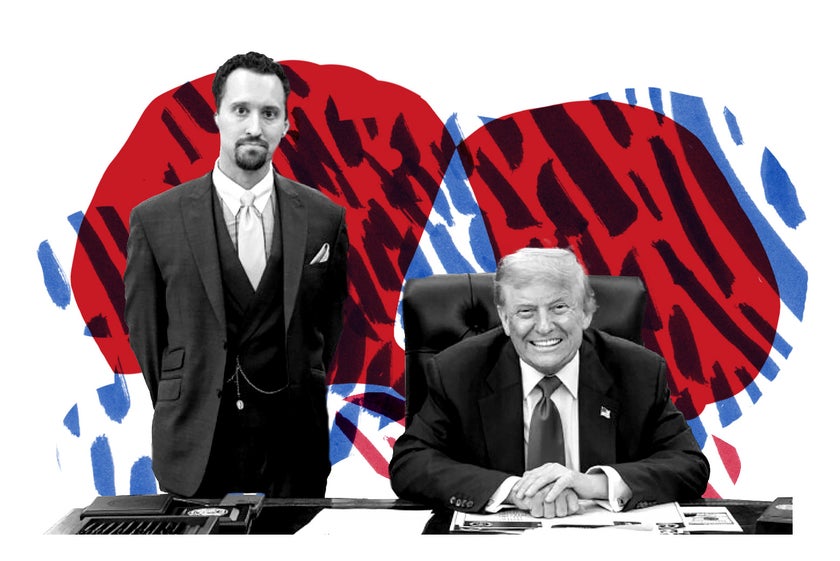- Tom Tomorrow on “defunding the police”;
- The unreliability of AI, with an example of John Scalzi;
- An essay about how the future will be mundane;
- Several links on Trump’s meeting with Putin in Alaska;
- Slate’s handy summary of people in the news this week (Antoni, Putin, Big Balls, et al.).
Curiously, given my mention two days ago of what “defunding the police” actually means, this 11-year-old cartoon by Tom Tomorrow popped up in my Facebook feed today. I’ll “quote” just the first two panels; the rest is at the link. Again, this is from 2014.
The Nib, Tom Tomorrow, 14 Aug 2014: Officer Friendly, subtitled “He’s just a good guy with a gun”
\\\
More about the unreliability of AI. Noted because it concerns SF author John Scalzi.

The Atlantic, Yair Rosenberg, 15 Aug 2025: Don’t Believe What AI Told You I Said, subtitled “The chatbots are lying about me.”
The article begins:
John Scalzi is a voluble man. He is the author of several New York Times best sellers and has been nominated for nearly every major award that the science-fiction industry has to offer—some of which he’s won multiple times. Over the course of his career, he has written millions of words, filling dozens of books and 27 years’ worth of posts on his personal blog. All of this is to say that if one wants to cite Scalzi, there is no shortage of material. But this month, the author noticed something odd: He was being quoted as saying things he’d never said.
“The universe is a joke,” reads a meme featuring his face. “A bad one.” The lines are credited to Scalzi and were posted, atop different pictures of him, to two Facebook communities boasting almost 1 million collective members. But Scalzi never wrote or said those words. He also never posed for the pictures that appeared with them online. The quote and the images that accompanied them were all “pretty clearly” AI generated, Scalzi wrote on his blog. “The whole vibe was off,” Scalzi told me. Although the material bore a superficial similarity to something he might have said—“it’s talking about the universe, it’s vaguely philosophical, I’m a science-fiction writer”—it was not something he agreed with. “I know what I sound like; I live with me all the time,” he noted.
The article goes on with the writer’s own experiences.
Scalzi posts about it here:
Whatever: Fix Your Hearts or Die, John Scalzi, 15 Aug 2025: Interviewed in The Atlantic about “AI” Slop
The post is short so I’ll quote in full:
Earlier this month I wrote about someone using an AI-generated quote and attributing it to me (along with an AI-generated picture of me which looked nothing like me), and I was more than a little annoyed by it. Now my experience and the experience of others who have had this happen, is the subject of an article in The Atlantic, titled “Don’t Believe What AI Told You I Said,” by Yair Rosenberg. I can attest that, indeed, it’s me being directly quoted in the piece, so you have that much assurance. And yes, this is a problem that will not go away, and is indeed likely to grow over time. Be vigilant about who and what you quote, folks.
\
AI seems to be telling people what they want to hear, not providing any kind of “truth,” because how is AI supposed to know what’s true? I raised this issue a few days ago. If AI reads all the texts of humanity, how is it to decide what is true? I suggested that it would look for internal consistency. But it’s not doing that.
\\\
Here again I’m linking a piece that I’ve not yet read, because I’m curious about the topic and want to see where the writer goes with it, and account for it. I’m reading it as I create this post.
NY Times, guest essay by Nick Foster, 16 Aug 2025: The Future Will Be Mundane
Interest in “what will the future be like” has nearly doubled worldwide since 2020, according to Google Trends, and in a very short space of time, our lives have become saturated with countless tales of what lies ahead.
Well, really? Hasn’t science fiction, all by itself, been evidence of peoples’ interest in the future, for the past century?
The key, yet again, is human psychology. From part way through:
Whether you look at the world from a technological, political, scientific or societal perspective, many aspects of life today are radically different from the lives our grandparents knew. But it doesn’t really feel like that, does it? These things seem ordinary and normal to us. We’ve absorbed them into our lives, and they feel like regular parts of 2025. In a word, they feel mundane.
Humans are incredibly adaptable. We’ve proved to be very capable of adjusting our behavior and weaving whatever comes our way into the ongoing fabric of everyday life. Throughout my career I’ve found that thinking about the future as an ordinary, lived experience — rather than a utopian fantasy or dystopian horror — always helps people embrace it, make sense of it and engage in more detailed conversations about it.
My reaction: well *of course* it will be mundane, mainly because the big changes more slowly than we realize, and out of view of most people living their mundane daily lives. There’s the aspect of short-term vs long-term thinking here; most people are capable only of the former.
When considering the future, we should always make space for grand, ambitious plans and alert people to potential collapses or disasters, but the work doesn’t end there. While tales of radical change might fill us with excitement or horror, they can also feel incredibly abstract. If we don’t start thinking about the future as an extension of the present — and if we don’t develop a dogged focus on the implications of change on the mundane rhythms of everyday life — the future will continue to feel distant, intangible and somehow “other,” and this weakness may grow into a critical failure of our generation.
Of course, yet again, science fiction is where the best writers try to blend this awareness of change with the practical fact that most people live mundane lives.
\\\
Today I’m demoting political events. What happened this weekend is that Trump met Putin in Alaska (though a couple times Trump said “Russia”) to negotiate the future of Ukraine.
It was not a victory for Trump, except for the people at Fox News.

The Atlantic, Jonathan Lemire, 15 Aug 2025: Well, What Did You Think Would Happen?, subtitled “Trump rolled out the red carpet for Putin but failed to make a deal.”
I’ll just list some other headlines.

JMG, 16 Aug 2025 (from Guardian): Russian State Media “Jubilant” After Alaska Summit
JMG, 16 Aug 2025: Trump: I’d Rate The Summit As A 10, Putin Told Me The 2020 Election Was Rigged And I Had Won By “So Much”
(He’ll believe anything)
NY Times, 15 Aug, updated 26 Aug 2025: Trump Returns to Washington After Putin Talks Yield No Ukraine Deal
\\
Finally for today: Slate’s handy summary of people in the news this week.

Slate, Ben Mathis-Lilley, 16 Aug 2025: Fan of Nazi Ships Elevated to Key Economic Role, subtitled “This guy really does not inspire confidence!”
This week, a man named “Big Balls” triggered a military invasion, the government explained somewhat unpersuasively why it has decided not to cure cancer, and Chuck Schumer racked up another big-time Chuck Schumer dub. (Chuck Schumer stays winning!) But first, let’s talk about the random guy from C-list right-wing media who looks like a member of Korn and has been assigned to ruin the world economy.
E.J. Antoni; Vladimir Putin; Big Balls; Chuck Schumer; Jay Bhattacharya; Ken Paxton; Laura Loomer.
Antoni is the one who has a big painting of the Nazi warship Bismarck on the wall behind his photo-ops. (See here.) (Back in my early days of buying paperbacks, I bought the Bantam Pathfinder edition of C.S. Forester’s SINK THE BISMARCK, in the edition shown here [link likely to expire].)







